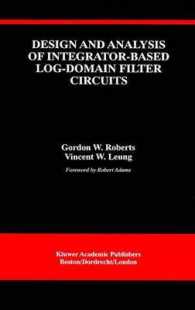- ホーム
- > 洋書
- > 英文書
- > Philosophy
Full Description
In the decades after its publication, Goethe's Wilhelm Meister's Apprenticeship served as a touchstone for such major philosophical and literary figures as Schopenhauer, Schleiermacher, and Schlegel, and was widely understood to be one of the greatest novels of the German canon. But in the decades and centuries following, the attention it has received in both disciplines has diminished in comparison to either Goethe's Sorrows of Young Werther or his Elective Affinities.
This volume follows the impetus of its early respondents to examine deeply what exactly Goethe's long and complicated novel is doing, and how it engages with problems and themes of human life. An interdisciplinary group of eminent scholars grapple with the novel's engagement with central philosophical questions such as individuality, development, and authority; aesthetic formation and narrative (and human) contingency; and gender, sexuality, and marriage. That these questions and their working-through in Wilhelm Meisters Lehrjahre are in tension with one another speaks ultimately to how literature explores philosophical questions in ways that are open-ended, creative, and contain potential for new and different solutions to living with them.
This unique philosophical approach to the form and purpose of a literary masterpiece illuminates new inroads into a novel at once famously complex and influential, and into the projects of one Germany's greatest writers.
Contents
Chapter 1: A Philosophy of Intuitive Thinking, Eckart Förster, translated by Allen Speight and Sarah V. Eldridge
Chapter 2: The Novel of its Times: Goethe's Wilhelm Meister's Apprenticeship on Life, Literature, and the New Tasks of the Bildungsroman, Allen Speight
Chapter 3: Narrative Direction: Novel Form and the Experience of Contingency in Wilhelm Meister's Apprenticeship, Sarah Vandegrift Eldridge
Chapter 4: Goethe's Wilhelm Meister: A Tendency of Romantic Philosophy, Elizabeth Millán
Chapter 5: To Err is Male: Bildung, Education, and Gender in Wilhelm Meister's Apprenticeship, Elisabeth Krimmer
Chapter 6: Seeing Faces in Wilhelm Meister: Goethe and Physiognomics, Martin Donougho
Chapter 7: Agency and embodiment in Wilhelm Meister's Apprenticeship, Charlotte Lee
Chapter 8: Hegel and Goethe's Wilhelm Meister's Apprenticeship, Stephen Houlgate
Chapter 9: Playing and Reality: The Constructive Powers of Illusion in Wilhelm Meister's Apprenticeship, Dorothea von Mücke
Chapter 10: Going On: Philosophy of Continuity and the Writing of Coherence in Goethe's Wilhelm Meister's Apprenticeship, Helmut Müller-Sievers





